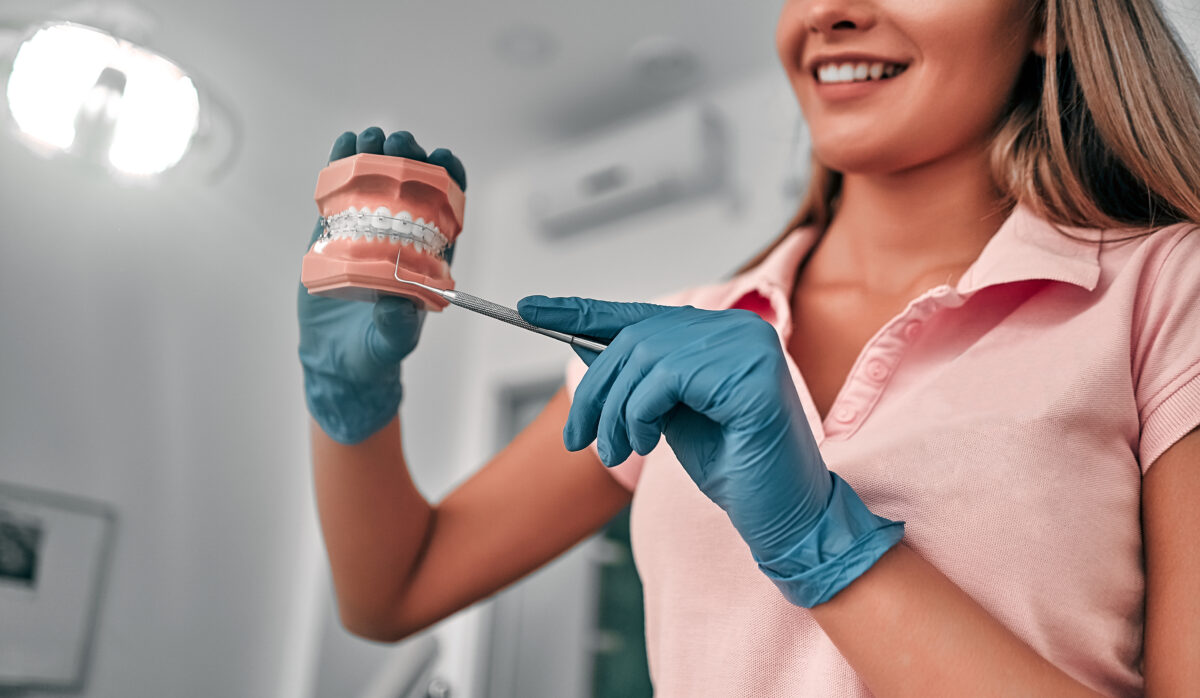
Endodontics is root canal treatment, which is necessary when the nerve and internal tissues of a tooth are infected or inflamed, for example due to deep decay or trauma. During the procedure, the dentist thoroughly cleans and disinfects the root canals, fills them with a special material and restores the tooth’s shape with a filling or crown. Modern endodontics is a painless and safe method that preserves the natural tooth and prevents the spread of infection.

The first and one of the most important steps in root canal treatment is a thorough initial diagnosis and the development of an individual treatment plan. During the visit, our specialist will ask the patient in detail about the symptoms – pain, sensitivity, swelling or other signs of discomfort.
A visual examination of the oral cavity and the tooth in question is carried out to assess the visible extent of the decay. A precise digital X-ray is taken to get a complete picture of the condition of the tooth and root canals. In some cases, a 3D computed tomography scan (CBCT) is prescribed to obtain even more detailed information on the anatomy of the canals and possible complications (e.g. branched or narrow canals).
These examinations allow to assess:
Based on the data obtained, the doctor draws up a detailed treatment plan, explains each stage of the procedure, predicts the duration of treatment and the manipulation required. The patient is given all the information about possible risks and costs in order to make an informed and safe treatment decision.
Our aim at this stage is maximum precision and confidence so that the treatment process is successful and without unexpected surprises.
Before starting a root canal treatment, our main goal is to provide the patient with maximum comfort and a completely pain-free experience. Therefore, the first step is to administer a local anaesthetic. We use modern and effective anaesthetics that act quickly and completely block pain in the treatment area. Thus, the patient feels neither pain nor discomfort during the procedure.
Once the anaesthesia takes effect, the specialist moves on to the next stage – creating access to the tooth canals. To reach the root canals, a small opening is created in the crown of the tooth. This step is carried out very carefully to preserve as much of the healthy tooth tissue as possible.
To ensure maximum precision, we work with magnification equipment – a dental microscope. This allows the doctor to see the canal system in detail, recognise complex or branching canal structures and avoid damage. Sometimes it may be necessary to remove previous fillings or other materials to gain full access to the canals.
The aim of this stage is to prepare the inside of the tooth so that thorough cleaning, disinfection and filling can be carried out.

Once the root canals have been accessed, we move on to one of the most important parts of endodontic treatment – cleaning and disinfecting the canals.
First, the root canals are thoroughly dilated and cleaned using special rotary and manual instruments. Our specialists use state-of-the-art technology and high-precision instruments to effectively remove all infected tissue, bacteria and necrotic material from the canal walls.
In addition to mechanical cleaning, antibacterial solutions are also used to rinse the canals and help to completely destroy micro-organisms. This process is very important to prevent re-infection and ensure a successful healing process.
Once the canals are completely cleaned and disinfected, they are drained and prepared for sealing. The canals are filled with a biocompatible material – most often gutta-percha, a flexible and safe material that precisely fills the entire volume of the canal. The material is placed together with a special sealing paste, which ensures complete sealing of the canal and protection against future bacterial penetration.
The aim of this step is to ensure that the canals are sterile and completely sealed, preventing any risk of further inflammation or complications.
Once the canals are filled, the tooth is temporarily sealed until the next stage – permanent restoration.

Frequently asked questions
No, the procedure is performed under local anaesthetic, so the patient feels nothing. Modern anaesthetics and technology ensure complete comfort during the treatment. There may be some discomfort or tenderness after the procedure, which usually passes within a few days
Canal treatment is necessary when the tooth nerve and internal tissues are infected or inflamed – usually as a result of a deep caries, fissure or trauma. Without treatment, the infection can spread, causing severe pain, abscesses or even tooth loss.
In most cases, the procedure takes 1 to 2 hours and can be done in one visit. In more complex cases, such as branched or very narrow canals, several visits may be necessary
After root canal treatment, the inside of the tooth becomes more fragile, so it is important to restore the crown properly – often with a permanent crown. Once restored, the tooth will fully function and last for a long time if good oral hygiene is maintained.
No special care is needed – the treated tooth should be cared for just like other teeth: regular brushing, flossing, mouthwashes and preventive visits to the dentist at least 1-2 times a year.
We usually recommend root canal treatment to preserve the natural tooth, but there are two alternatives:
OUR EXPERTS
Hygienist
Hygienist
Hygienist
Key facts about the clinic
Our clinic offers the latest dental technologies and a personal approach to each patient. We guarantee the highest quality materials and professional care.
Valis Dental has been operating since 1992 and is one of the first private dental practices in Latvia. Our long-standing experience allows us to provide safe and effective solutions.
We offer everything from routine hygiene and whitening to complex implant and orthodontic procedures. We have everything you need for a beautiful and healthy smile.
We use the latest digital diagnostic and treatment methods to ensure painless and effective treatment. Our clinic has a friendly and homely atmosphere.